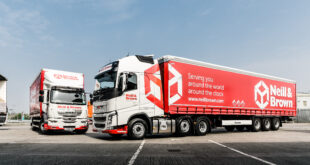The advantages offered by fuel cards are widely known. More efficient record keeping, no need for drivers to carry cash with them and spending control are just a few examples. By now the fuel card has demonstrated its benefits to many haulage firms. This makes it a wanted product, not only for organisations and their drivers, but also for fraudsters. The current economic conditions make it important for transport firms to maintain their costs at the lowest possible level. For this reason, prevention of additional costs and controlling actions resulting from fraud cases is better than cure.
Present-day fuel cards are either vehicle-bound or person-bound. In this respect, the vehicle-bound card is the best alternative for insurers when it comes to tracking fraud, also because the vehicle’s mileage records are linked to its fuel consumption. This enables quick detection and tracking of fraudsters and restriction of ongoing theft of fuel.
Card use
Whereas fuel cards may be vehicle-bound, drivers certainly aren’t. The 24-hour economy, which is also spreading out over the transport industry, reduces standstill among trucks and puts more than one driver on the same vehicle. As a result, more than one driver will know the four-digit pin code of a certain fuel card. Where standstill mainly brings additional costs to the transport industry in general, shifts in the manning of trucks make it important for drivers to become aware of fuel card security and handling.
Limits and level of service
The DKV CARD can be configured with various limits and levels of service. Purchase amounts per fuel card can be limited on a daily, weekly and monthly basis, for instance. Apart from improved cost control this also means minimisation of the risk of misuse. As the DKV CARD has two service levels you can easily and conveniently control the service spectrum of the fuel and service card. These levels are:
RC 30 (Service Level 30): including diesel fuel, fuel and lubricants, toll tunnels and road charges
RC90 (Service Level 90): includes all service of RC 30 plus emergency breakdown call, repair, recovery, towing, tyres, cooling system, ferries, combined transport, washing, accessories, vehicle-relates shop articles.
Focus on security
The DKV Card contributes to driver safety at all times, for instance because it removes the necessity of carrying large amounts in cash. Moreover, thanks to its vast European fuel station network it is not necessary for drivers to deviate from a chosen route, and still select the cheapest fuel station around.
Obviously, to ensure this level of security, drivers must handle their cards prudently. Below you will find a few possible points for improvement of driver awareness regarding fuel card use.
- Memorize pin codes and do not leave written or printed codes behind in the vehicle;
- While entering pin codes at terminals, ensure that this cannot be secretly observed, and do not pass pin codes on to fuel station staff;
- Drivers must take their fuel cards with them when they leave their vehicles. At the end of a shift, immediately pass the fuel card on to the colleague who takes over the vehicle, or hand the fuel card together with the vehicle keys in at the office on return.
Benefits that last
Although fuel cards offer the best of security thanks to – among other things – their four-digit pin code, the actual use of the card forms their biggest stumbling block where it comes to card fraud. The benefits for transport firms using fuel cards become even better when firms increase and sharpen their drivers’ awareness of the necessity of safe use. In the long term this will reduce risks and make implementation of fuel cards in the existing business processes even more interesting.
You drive, we care.
 DKV BeNeLux You drive, we care
DKV BeNeLux You drive, we care

